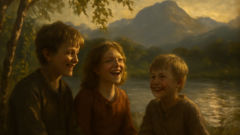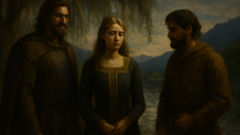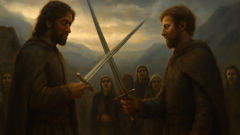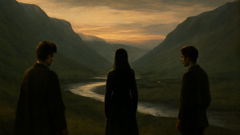Introduction
Beneath the sweeping skies of western Iceland, where rivers carve silver ribbons through green pastures and mountains rise like ancient sentinels, lies Laxardalr—a valley steeped in the memory of sagas and the echo of old heartbreaks. It’s a land where the Atlantic winds shape every stone and willow, and the people’s stories weave into the very moss that clings to their turf-roofed halls. In the late 10th century, this valley wasn’t just a place of sheepfolds and barley fields, but the stage for a drama that would be whispered beside hearths for centuries: the tale of Gudrun Osvifsdottir and her two foster-brothers, Kjartan Olafsson and Bolli Thorleiksson.
Theirs is a story born in the age of chieftains and gods, where kinship, fate, and desire were in constant, fraught tension. To live in Laxardalr was to know both hardship and loyalty, to weigh every word against a code as sharp as the wind off the glacier. Gudrun, famed even beyond the valley for her beauty and wit, was as much a force of nature as the storms that battered the fjords. Kjartan, proud descendant of Olaf the Peacock, was a hero in the making—golden-haired, strong, beloved by all but never more than by Bolli, his cousin and sworn brother. Their bond, forged in childhood, would soon face the test of ambition, love, and betrayal that would alter not just their own fates, but the fortunes of all Laxardalr.
In this saga, the land itself is a silent witness: from Gudrun’s dreams by the salmon-rich river to the secret meetings in birch groves; from the clang of weapons in smoky halls to the hush of sorrow on frostbitten mornings. The choices made by these three—driven by love’s ache and the iron-bound customs of their world—would ripple across generations, a testament to how passion and pride can raise and ruin even the mightiest families. This is the legend of Laxardalr, where love kindled both joy and tragedy, and where the wild Icelandic landscape held their secrets long after their voices faded.
Roots and Prophecies: The Childhoods of Gudrun, Kjartan, and Bolli
In the cradle of Laxardalr, where sheep grazed on windswept hills and sagas were shaped by the seasons, three destinies began to intertwine long before their owners understood the weight of their futures. Gudrun Osvifsdottir was born to Osvif Helgason, a shrewd chieftain known for his wisdom, and Thorhild, a woman as gentle as the valley’s summer rain. From the first, Gudrun was marked by a striking beauty and a mind that ran deeper than the fjord. She learned to read runes before most girls could spin flax, and her wit made her as feared in conversation as in counsel.

Not far off, at Hjardarholt, lived Kjartan Olafsson, grandson to the famous Olaf the Peacock—himself a man whose exploits were legend. Kjartan grew beneath tales of his father Olaf’s journeys abroad, his mother Thorgerd’s noble heritage, and the stories of distant courts. The valley watched him come into his own: tall, athletic, fair-haired, and quick to smile. His pride was gentle, but it was pride nonetheless—an inheritance as potent as any land or silver. By Kjartan’s side was Bolli Thorleiksson, his cousin in blood but closer than any brother could be. Raised together, they hunted foxes in the birch forests and wrestled by the river’s edge. Where Kjartan was fire—brilliant, sometimes blinding—Bolli was water: steady, loyal, deep. Few guessed how often Bolli’s heart beat for the same things as Kjartan’s, even as he watched his cousin claim every prize.
The valley’s rhythms shaped their youth: winters spent in smoky halls swapping tales and riddles, springs that brought lambing and the promise of new beginnings. Yet beneath the surface, old prophecies lingered. Gudrun, in her adolescence, dreamed four strange dreams—each filled with ominous symbols: a coif, a silver ring, a gold band, and finally a bright helmet filled with water. She recounted these to Gest the Wise, who interpreted them as signs of four marriages, each with its own sorrow. Gudrun listened with silent dread, her gaze cast toward the river as if searching for answers in the swirling currents.
The trio’s bond strengthened as they entered adulthood. Gudrun became a fixture at gatherings, her clever speech winning respect as easily as her beauty won longing glances. Kjartan and Bolli, inseparable still, found their friendship deepening into something more complex. They were rivals in games and partners in work, but both found their eyes drawn ever more often to Gudrun. The valley itself seemed to watch with breath held: old Osvif kept his thoughts close, but many could see the storm clouds gathering on horizons not yet visible to those at the center of this budding triangle.
By the time their childhoods gave way to the first ache of love and ambition, it was clear to all that something powerful—and perhaps dangerous—was taking root in Laxardalr. The three stood at the threshold of adulthood, bound by affection, prophecy, and the land itself. The salmon leapt in the river, the mountains stood silent, and fate, inexorable as the North Atlantic tides, began to pull them toward the choices that would echo for generations.
Hearts Entwined and Torn: The Blossoming and Betrayal of Love
As years unfolded and the valley matured with them, Gudrun’s beauty became legend, drawing suitors from distant fjords. Yet it was with Kjartan that her laughter rang most true. When they met beneath the willows by the river, their words carried both mischief and a gravity neither could escape. Their love, though unspoken at first, grew as surely as the wildflowers in summer meadows. They exchanged riddles and songs, and often, Bolli was by their side—sometimes a companion, sometimes a quiet shadow.

In the warmth of the Laxardalr summer, Kjartan and Gudrun pledged themselves to one another in secret. Their promises were whispered between rushes and stones, as the water flowed on. Bolli watched from afar, his heart torn between his loyalty to Kjartan and a deepening ache for Gudrun that he tried to bury beneath laughter and duty. Yet love is rarely satisfied with silence. Rumors began to stir among the valley folk: tales of Gudrun’s glances at Kjartan, of late-night walks, of songs with hidden meanings. Osvif, shrewd as ever, weighed Kjartan’s suit against the prospect of foreign alliances.
Kjartan’s restless spirit drew him to dream of travel, as his father Olaf once had. News reached Laxardalr of Christianity’s growing power abroad, and a desire for adventure burned in Kjartan’s chest. He confided in Gudrun that he would journey to Norway and perhaps farther—swearing he would return for her. Gudrun’s eyes flashed with pain and anger; she’d heard tales of men lost to foreign lands and feared being left behind. She set him an ultimatum: if he truly loved her, he would not leave. But the blood of explorers ran hot in Kjartan’s veins. He promised his absence would be brief and that nothing—not even the most beautiful maiden of Norway—would keep him from her.
Before leaving, Kjartan secured a promise from Bolli: to look after Gudrun in his absence and to protect her honor. Bolli agreed, swallowing his secret hopes. With a heavy heart, Gudrun watched as Kjartan sailed from the fjord, the wind billowing in his cloak and his eyes fixed on the horizon. The seasons turned. Letters grew scarce, rumors less so. Some whispered that Kjartan had found favor at King Olaf Tryggvason’s court, that foreign customs and new faith had claimed his allegiance. Gudrun’s patience wore thin; pride and wounded love twisted inside her. She drew closer to Bolli, whose devotion was constant and whose presence was a balm against loneliness.
It was not long before Osvif pressed Gudrun to consider marriage again—this time to Bolli. Bolli struggled against his feelings and his promise, but Gudrun, stung by pride and grief, at last agreed. Their wedding was a somber affair; the valley’s laughter seemed muted beneath the mountain’s shadow. News of their union reached Kjartan in Norway. His heart broke at the betrayal, and the old friendship between the cousins turned brittle as frost. When Kjartan finally returned to Iceland, he found the valley changed. His love had wed his foster-brother. Coldness grew between the once-inseparable friends, and Gudrun’s eyes held regret she dared not speak.
Love had blossomed like a rare flower—only to be torn from its roots by pride, distance, and fate. The valley bore witness as happiness curdled into sorrow, and the first tragic notes sounded in a melody that would haunt all three for the rest of their days.
Vengeance and Fate: The Price of Broken Bonds
In the wake of Gudrun and Bolli’s marriage, the valley seemed changed—its familiar meadows tinged with a sorrow that clung to every gathering and feast. Kjartan returned from Norway, his face older, marked by distant wars and the ache of betrayal. He brought with him not just new customs but a coldness that unsettled those who remembered the laughter of his youth. Gudrun’s pride kept her distant, yet her heart twisted with every word left unspoken.

Tensions simmered between Kjartan and Bolli, once closer than brothers but now bound by suspicion and wounded honor. The people of Laxardalr watched as former allies became wary rivals. Feasts grew quieter; eyes darted over goblets of mead. Even the land felt uneasy: storms lingered longer on the mountain peaks, and old women muttered of omens seen in the river’s restless flow.
Kjartan tried to rebuild his life. He wed Hrefna Asgeirsdottir—a gentle soul whose affection could not erase the scars left by Gudrun’s absence. Yet happiness eluded him. When Hrefna received a precious headdress—a gift meant for Gudrun—whispers grew. Gudrun’s jealousy flared, fueling bitter exchanges that echoed through Laxardalr’s longhouses. A series of slights followed: stolen treasures, heated words, challenges thrown like gauntlets between old friends. Pride drove both men to stubbornness, and Gudrun’s longing and anger only deepened the rift.
As spring returned, so did violence. A feud erupted between the households of Olaf the Peacock and Osvif Helgason. Raids were carried out in the night: sheep vanished, barns burned, men wounded. The valley’s fragile peace was shattered. All the while, Gudrun watched in despair as her choices sowed ruin among those she loved. She dreamt often of Kjartan—sometimes as he was in youth, sometimes as a stranger, eyes gone cold as fjord ice.
The final blow came during a fateful encounter near Saelingsdal. Bolli and a band of men ambushed Kjartan while he journeyed alone to visit relatives. Words escalated quickly; swords were drawn beneath the pale sky. Though Bolli hesitated, love and loyalty at war within him, it was he who dealt the killing blow to Kjartan—his own foster-brother, slain by the hand he had trusted above all others. Bolli staggered away, bloodied blade trembling in his grip, the valley echoing with a grief that would never truly fade.
Kjartan was mourned by all who knew him. Hrefna faded into quiet sorrow, while Gudrun’s anguish became legend—a keening cry beneath the northern lights. The old prophecies had come to pass: love twisted into loss, friendship into bloodshed. Bolli returned home a changed man, haunted by what he had done. The valley’s feuds grew fiercer, and the once-bright laughter of youth was replaced by the heavy silence of regret.
In Laxardalr, even the wind seemed to mourn. The people learned anew that fate’s chains are not easily broken, and that love—when tangled with pride—can cost more than any can bear.
Conclusion
Years passed in Laxardalr, but the wounds left by Gudrun, Kjartan, and Bolli’s tragic triangle never fully healed. The valley remembered them not just in stories told by firelight but in the quiet spaces between words: a glance over a field, a hush when salmon leapt in the river, the way snow softened the graves on windswept hills. Bolli lived out his days weighed by remorse, striving to atone through kindness to his children and service to his kin. Gudrun remarried several times, each union shaped by loss and longing. Though she became famed as a wise woman—sought for advice, respected for her strength—her eyes always held a shadow of regret.
On her deathbed, Gudrun was asked who she loved most among her husbands. She answered in riddles: “To him I was worst whom I loved most.” The valley understood then that some wounds run deeper than blood or bone—that love’s memory endures even after all else is lost. The saga of the people of Laxardalr became a warning and a comfort: that life is shaped by choices made under the press of longing and pride; that fate cannot be outrun; and that even in tragedy, beauty lingers in the telling.
So Laxardalr kept its silence, letting the grass grow over old battlefields and the river sing its unchanged song. Yet whenever the northern lights danced above the mountains or the wind whispered through birch leaves, those who listened closely could still hear echoes of Gudrun’s sorrow, Kjartan’s pride, and Bolli’s pain—woven into the very soul of Iceland.













